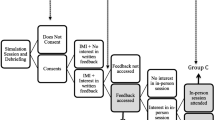Abstract
Purpose
Surgical residents undergo numerous summative and formative assessments throughout training. However, it is unknown how perceptions of assessment intention and use impact trainee motivation and subsequent performance outcomes. We use goal orientation theory to explore how resident perception of assessment type influences motivation levels.
Methods
We conducted a prospective cohort study of general surgery residents’ motivation, with residents completing an electronic survey before a simulated surgical skills assessment. Items included resident perception of assessment type (formative vs summative), motivation scores (average of responses, 1 = Strongly Disagree to 5 = Strongly Agree), and post-graduate year (PGY). Mastery and performance motivation scores were compared based on perceived assessment type and PGY level.
Results
Sixty of 63 residents (RR = 95%) completed the survey. Residents who felt the assessment was formative had significantly higher mastery motivation scores than those who felt it was summative (mean = 4.1 vs 3.4, p = 0.006). Motivation scores varied significantly between residents of differing PGY levels, specific to mastery motivation (p < 0.001) with no differences seen in performance motivation. PGY1 and PGY3 residents had significantly higher mean mastery motivation scores than PGY5 residents (PGY1: 4.4, PGY3: 4.0 vs PGY5: 2.8, p < 0.01).
Conclusions
Trainees who believe they are completing a skills assessment with the goal of skill development are more likely to indicate they are motivated to master the skill. Further, we demonstrate that more junior trainees exhibit higher mastery motivation than chief residents.

Similar content being viewed by others
Data availability
The data sets generated during and analyzed during the current study are available from the corresponding author on reasonable request.
References
Cook DA, Artino AR Jr. Motivation to learn: an overview of contemporary theories. Med Educ. 2016;50(10):997–1014.
Harackiewicz JM, Barron KE, Pintrich PR, Elliot AJ, Thrash TM. Revision of achievement goal theory: necessary and illuminating. J Educ Psychol. 2002;94(3):638–45.
Elliot AJ, McGregor HA. A 2x2 achievement goal framework. J Pers Soc Psychol. 2001;80(3):501–19.
Cook DA, Castillo RM, Gas B, Artino AR Jr. Measuring achievement goal motivation, mindsets and cognitive load: validation of three instruments’ scores. Med Educ. 2017;51(10):1061–74.
Wolters CA. Advancing achievement goal theory: Using goal structures and goal orientations to predict students’ motivation, cognition, and achievement. J Educ Psychol. 2004;96:236–50.
King RB, McInerney DM. Do goals lead to outcomes or can it be the other way around?: causal ordering of mastery goals, metacognitive strategies, and achievement. Br J Educ Psychol. 2016;86(2):296–312.
Huang C. Discriminant and criterion-related validity of achievement goals in predicting academic achievement: a meta-analysis. J Educ Psychol. 2012;104(1):48–73.
Payne SC, Youngcourt SS, Beaubien JM. A meta-analytic examination of the goal orientation nomological net. J Appl Psychol. 2007;92(1):128–50.
Button SB, Mathieu JE, Zajac DM. Goal orientation in organizational research: a conceptual and empirical foundation. Organ Behav Hum Decis Process. 1996;67(1):26–48.
Ames C, Ames R, Felker DW. Effects of competitive reward structure and valence of outcome on children’s achievement attributions. J Educ Psychol. 1977;69(1):1–8.
Ilgen DR, Fisher CD, Taylor MS, Campbell JA. Consequences of individual feedback on behavior in organizations. J Appl Psychol. 1979;64(4):349–71.
Boud D. Assessment and learning: contradictory or complementary? In: Knight P, editor. Assessment for learning in higher education. 1st ed. London: Kogan Page; 1995.
Hoffman RL, Hudak-Rosander C, Datta J, et al. Goal orientation in surgical residents: a study of the motivation behind learning. J Surg Res. 2014;190(2):451–6.
Gardner AK, Diesen DL, Hogg D, Huerta S. The impact of goal setting and goal orientation on performance during a clerkship surgical skills training program. Am J Surg. 2016;211(2):321–5.
Gardner AK, Jabbour IJ, Williams BH, Huerta S. Different goals, different pathways: the role of metacognition and task engagement in surgical skill acquisition. J Surg Educ. 2016;73(1):61–5.
Lewin K. Principles of topological psychology. New York: McGraw-Hill; 1936.
Breaux DMTP, Munyon WA, Hochwarter WA, Ferris GR. Politics as a moderator of the accountability–job satisfaction relationship: evidence across three studies. J Manag. 2009;35:307–26.
Elliot AJ, Murayama K. On the measurement of achievement goals: critique, illustration, and application. J Educ Psychol. 2008;100:613–28.
Cook DA, Castillo RM, Gas B, Artino AR Jr. Measuring achievement goal motivation, mindsets and cognitive load: validation of three instruments’ scores. Med Educ. 2017;51(10):1061–74.
Cook DA, Gas BL, Artino AR Jr. Measuring mindsets and achievement goal motivation: a validation study of three instruments. Acad Med. 2018;93(9):1391–9.
Cauley KM, McMillan JH. Formative assessment techniques to support student motivation and achievement. Clearing House. 2010;83(1):1–6.
Shepard LA, Penuel WR. Using learning and motivation theories to coherently link formative assessment, grading practices, and large-scale assessment. Educ Meas Issues Pract. 2018;37(1):21–34.
Meece JL, Anderman EM, Anderman LH. Classroom goal structure, student motivation, and academic achievement. Annu Rev Psychol. 2006;57:487–503.
Gillet N, Vallerand R, Lafreniere M, Marc-Andre K. Intrinsic and extrinsic school motivation as a function of age: the mediating role of autonomy support. Soc Psychol Educ. 2012;15:77–95.
Lepper MR, Corpus JH, Iyengar SS. Intrinsic and extrinsic motivational orientations in the classroom: age differences and academic correlates. J Educ Psychol. 2005;97(2):184–96.
Stoa R, Chu TL. An argument for implementing and testing novelty in the classroom. Scholarship Teach Learn Psychol. 2020. https://doi.org/10.1037/stl0000223.
Author information
Authors and Affiliations
Corresponding author
Ethics declarations
Conflict of interest
This research did not receive any specific grant from funding agencies in the public, commercial, or not-for-profit sectors. The authors have no relevant financial or non-financial interests to disclose.
Rights and permissions
Springer Nature or its licensor (e.g. a society or other partner) holds exclusive rights to this article under a publishing agreement with the author(s) or other rightsholder(s); author self-archiving of the accepted manuscript version of this article is solely governed by the terms of such publishing agreement and applicable law.
About this article
Cite this article
Lund, S., D’Angelo, J.D., Gardner, A.K. et al. General surgery resident motivation: the effect of formative compared to summative simulated skills assessments. Global Surg Educ 1, 55 (2022). https://doi.org/10.1007/s44186-022-00062-9
Received:
Revised:
Accepted:
Published:
DOI: https://doi.org/10.1007/s44186-022-00062-9




